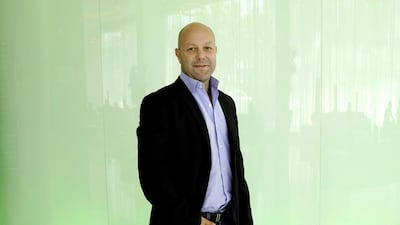After having worked in the digital advertising industry for many years, Karim Khalifa decided it was time to set up on his own. In 2009, he founded Digital Republic in Cairo.
Founders of new businesses have enough to contend with without a revolution being thrown into the mix – but contrary to what might be expected, Egypt’s unrest helped to establish Digital Republic.
Because the protesters relied on their mobile phones and social media for news and communicating, it served to raise the awareness and use of digital media among the population at large. It was no longer just the tech-savvy youth who were Tweeting and Facebooking.
"I remember the day my 60-year-old mother suddenly joined Facebook and sent me a friend request," Mr Khalifa says.
"Internet uptake in Egypt [has increased] significantly over the past three years. The argument with our clients in the beginning was why they should use online; after the revolution they were very convinced because they could see all around them it was no longer why, it was a question of how should we use it."
Smartphone penetration varies across the Middle East: from 75 per cent in Qatar and 73 per cent in the UAE to 26 per cent in Egypt, according to a survey by Cisco. However, digital advertising remains a "tough nut to crack" in the region, says Mr Khalifa.
There are two reasons for this. First, a large number of players are involved — mobile operators, agencies, brands, publisbers, developers, users — and they are not cohesive. Second, brands and advertising agencies often to do not yet accord mobile advertising the same importance as they do print, TV or online advertising.
Spending on digital ads in the Middle East and North Africa is forecast to reach US$1.35 billion this year and increase to $3.80bn by 2017, according to eMarketeer, a research and analysis firm. (Globally, digital spending now is $117.6bn and expected to rise to $173.2bn in 2017.) Of that, mobile spending is currently 3.7 per cent of digital spending. This will grow to 8.9 per cent in 2017.
“Mobile advertising needs to be approached with a specific mindset — it’s no longer sufficient to have it as an extra if there is a bit of budget left over,” Mr Khalifa says.” Mobile has to be part of the thought process from the very beginning.”
There are also a number of factors to consider when putting together a mobile campaign. Phones are personal devices and “you will shoot yourself in your foot” if there is a sense that your ad is an invasion of privacy or disruptive, he says. Those devising mobile campaigns need to understand the technology and be able to use it creatively. And they need to add value, he adds.
So how should this be done?
Mr Khalifa cites the mobile campaign Digital Republic put together for McDonald’s when the burger chain introduced apple slices into its Happy Meals as something that worked well.
McDonald’s asked the agency to come up with “a creative way to engage parents in store and online with social media and a mobile component”.
The agency created an “augmented reality campaign” – adding computer-generated sound, graphics or video to a live scene. In the case of McDonald’s, Digital Republic created an app. When a customer opened the app and pointed his phone’s camera at the Happy Meal box, the phone recognised the box. The app then launched a 3D apple tree game that allowed children to collect points that would earn them free gifts. There was also information about the nutritional benefits of apples.
“There were people in-store helping to download the app; kids would play and count the apples and having people pointing their phones at boxes in the stores helped drive a bit of sales and create a buzz. It entertained the kids who hopefully got an time for free if they finished a level or two. And it was in 3D so it looked cool too.
“It ticked the boxes for a lot of the things we need to make sure are done correctly: it did not impinge — it was not intrusive or disruptive because customers chose to download it; it was entertaining; it adds value in the sense that you might get something for free and, from the brand side, the buzz drove sales and brought awareness about the new apple component in the Happy Meals for kids.”
Since its inception Digital Republic has racked up an number of awards, now employs 60 people and has opened an office in Dubai, which handles regional business. Mr Khalifa agrees with predictions that spending on mobile advertising will increase.
“There is definitely going to be a major drive of adverts going online and on video,” he says. “We will also see an increase in video on mobile not just online. Social [media] will continue to grow increasingly on mobile. The agencies and brands that will play it right are the ones that are going to be making sure that content is really the driver behind strong interactive, good engagement between consumers and brands.”
lgutcher@thenational.ae

